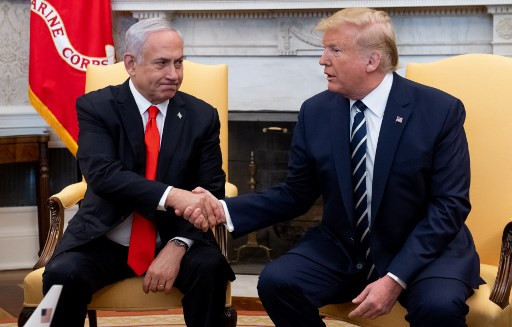
Spoils of freedom
by Editorial BoardJust over two months after the International Day of Solidarity with the Palestinian People on Nov. 27, 2019, the United States asked the world to choose between American supremacy in the Middle East and a disenfranchised Palestinian entity that it has politically doomed to fail.
US President Donald Trump unveiled his self-aggrandizing Middle East peace plan this week, which experts say seemingly offers a “realistic” solution to the decades-old Palestinian-Israeli conflict, while actually baiting allies into submission on account of an engineered threat by Iran.
“The threats posed by Iran’s radical regime for example, have led to a new reality, where the State of Israel and its Arab neighbors now share increasingly similar perceptions of the threats to their security,” one passage reads.
In other words, Trump has turned the question of Palestine, which has been built on decades of United Nations resolutions and international law, into a bargaining chip to sell its security and economic services.
Reactions range from the outspoken support of US allies like Bahrain and the United Arab Emirates to strong contempt from Iran and Turkey, as well as numerous others along the spectrum — Palestine’s preemptive rebuke notwithstanding. One thing is certain; the onset of fatigue is palpable, and Washington is looking to seize the opportunity with pragmatism in mind.
The rest of the world — particularly in the Muslim world – has also chimed in, with some calling the deal a non-starter while others look to carefully study the US proposal.
The Organization of Islamic Cooperation (OIC) is expected to announce its stance next week during an extraordinary ministerial meeting that one diplomat says can “unite the voices of all OIC members”. Meanwhile, Malaysia is to convene at the end of next month a UN-backed conference reaffirming the commitment of Southeast Asian nations to the Palestinian agenda, although the message rings somewhat less among non-Muslim or Muslim-minority countries in the region. For its part, Indonesia has issued a statement reaffirming the need to respect international law and other “internationally agreed parameters”, code for some of the things that Trump’s so-called “deal of the century” obscures or blatantly ignores.
Kuala Lumpur and Jakarta have also lobbied to include the question of Palestine in ASEAN’s consensus-led communiques — to modest success.
However, as the largest Muslim-majority country, Indonesia should be able to do more. Indonesians, who have happily jumped on the bandwagon in support of Muslim minorities such as the Rohingya in Myanmar and the Uighurs in China in the recent past, should rally support for Palestinians in this time of need. This is the moment for the people to stand up and act on the constitutional mandate, not only in support of the Palestinians, but also in defiance of a US government that looks increasingly toothless and unwilling to become the role model it was once for many other countries, and for its abandonment of the multilateral system.
In doing so, Indonesia will be able to convince the millions of Palestinians that they can continue to dream of a day when they too can enjoy the spoils of freedom.